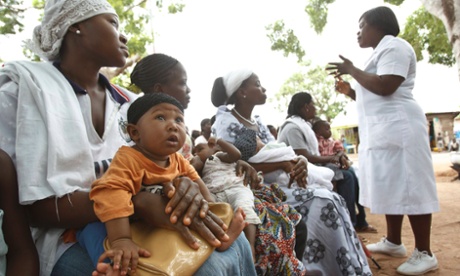
Two giant pharmaceutical companies should lower the price of a new vaccine against pneumococcal disease that is needed by children in developing countries, but is unaffordable for some of their governments, say the volunteer doctors of Médecins sans Frontières (MSF).
In a new report on vaccine pricing, MSF says British company GlaxoSmithKline (GSK) and US giant Pfizer should slash the price of the vaccines to $5 (£3.20) per child in developing countries. At the moment, the two big pharma companies are the sole manufacturers of the pneumococcal vaccine.
The secretive nature of the industry means that prices are not disclosed in all countries, but, where they are known, there is huge variation. Hospitals in Morocco pay nearly $64 and in Tunisia $67, whereas the manufacturer’s price in France is less – at about $58.
“We have an irrational situation where some developing countries like Morocco and Tunisia are paying more for the pneumococcal vaccine than France does,” said Kate Elder, vaccines policy adviser for MSF’s Access Campaign. “Because of the astronomical cost of new vaccines, many governments are facing tough choices about which deadly diseases they can afford to protect their children against.”
MSF says the pneumococcal vaccine is a big contributor to the soaring cost of vaccinating a child in the poorest countries – it accounts for 45% of the total. GSK and Pfizer have collectively reported more than $19bn in global sales of the vaccine since it launched.
The full vaccination schedule which every child should receive includes 12 vaccines. Since 2001, the cost of the full package has risen dramatically, says the report, The Right Shot: bringing down barriers to affordable and adapted vaccines.
“The price to fully vaccinate a child is 68 times more expensive than it was just over a decade ago, mainly because a handful of big pharmaceutical companies are overcharging donors and developing countries for vaccines that already earn them billions of dollars in wealthy countries,” said Rohit Malpani, director of policy and analysis for the MSF campaign.
“Donors will be asked to put an additional $7.5bn on the table to pay for vaccines in poor countries for the next five years, with over one-third of that going to pay for one vaccine alone, the high-priced pneumococcal vaccine; just think of how much further taxpayer money could go to vaccinate more children if vaccines were cheaper. We think it’s time for GSK and Pfizer to do their part to make vaccines more affordable for countries in the long term, because the discounts the companies are offering today are just not good enough.”
The report is published before next week’s meeting in Berlin, where donor governments will be asked to top up the coffers of Gavi – the vaccine alliance. Gavi subsidises the price for the poorest countries, but middle-income countries are increasingly struggling to pay, says MSF.
More than a quarter of countries now eligible for Gavi support will lose it next year, as they “graduate” because of their increasing per capita income. Angola, for instance, will lose support in a year, which will push up its vaccines bill by 1,500%.
MSF has difficulty affording the costs of vaccinating children in the emergency situations where it works. “MSF faces increasing challenges in offering full immunisation to children in our projects. The rising price of the basic vaccines package means that we can’t afford to protect kids living in crisis, and nor can many countries who want to protect their children,” said Dr Greg Elder, MSF deputy director of operations, in the report.
In a statement, GSK said its pneumococcal vaccine is “one of the most complex we’ve ever manufactured, essentially combining 10 vaccines in one”.
It added: “For Gavi-eligible countries, we are providing this vaccine at a deeply discounted price. At this level, we are able to just cover our costs. To discount it further would threaten our ability to supply it to these countries in the long-term. Nevertheless, we continue to look at ways to reduce production costs and any savings we make we would pass on to Gavi.”
Pfizer said 60% of the world’s poor children are covered by the Gavi programme at a price that is “far below” the cost to manufacture the vaccine.
In a statement, Pfizer aded that it had committed to providing Prevenar 13 until 2025 at a reduced price to countries who no longer qualify for Gavi support. “This gives countries the best chance of maintaining their pneumococcal vaccination programmes and sustaining the significant public health gains these programmes provide, even after Gavi support ends.”

